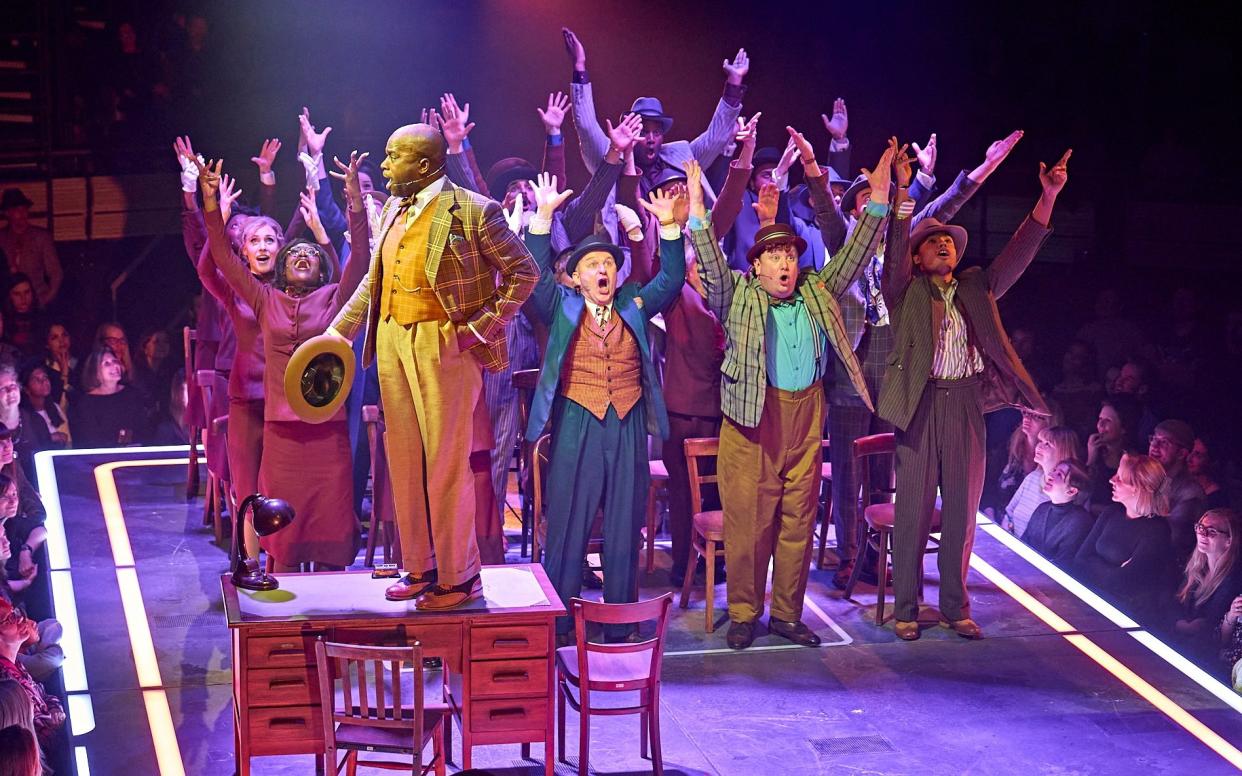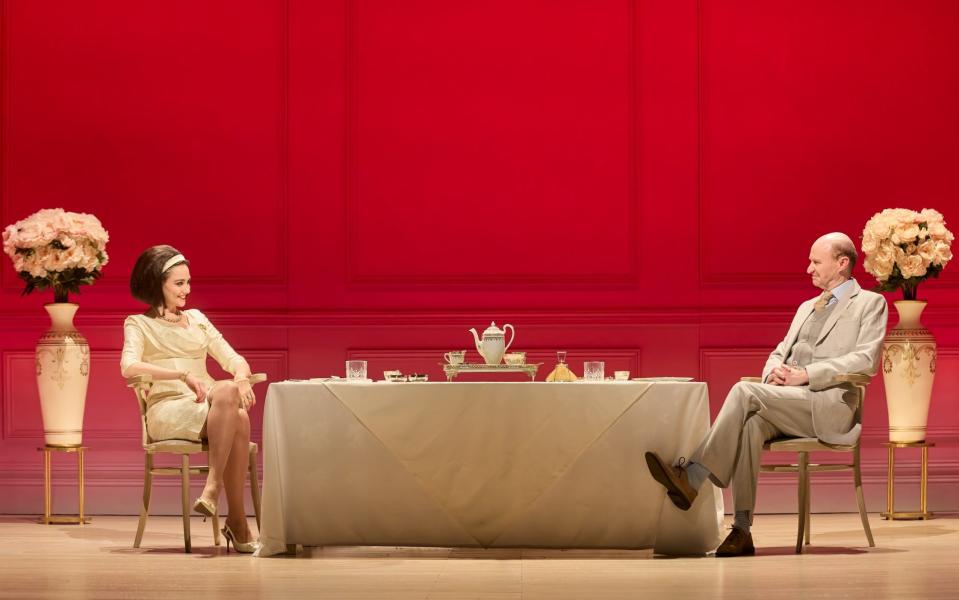British theatre is a shadow of its former self – but our comedy scene is thriving

- Oops!Something went wrong.Please try again later.
- Oops!Something went wrong.Please try again later.
- Oops!Something went wrong.Please try again later.
- Oops!Something went wrong.Please try again later.
- Oops!Something went wrong.Please try again later.
2023 in Theatre: Creative talent is being drained away
It’s hard to survey British theatre and not be struck by how hollowed-out it looks. Yes, it “came back” from the pandemic – a miracle in itself – but the shockwaves of that period, combined with the cost of living crisis, have left it a shadow of its former self.
Sure, 2023 had some big, booming hits to counter the gloom – not least Nicholas Hytner’s glorious promenade revival of Guys and Dolls at the Bridge Theatre; it opened in March and is booking until next August, a testament to an undiminished demand for its feelgood escapism. Yet Hytner told me that his calculated long-runner is bound up with the venue’s need to pay back its loan from the Culture Recovery Fund. It’s a symptom of tough times, not of rude health.
In the subsidised sector, there hasn’t been a lot to sing and dance about. Output at regional theatres has slumped; it was nice to see The Sound of Music at Chichester this summer, but more such flagship shows are needed. In Wales, the national theatre organisation (NTW) lost its funding (though this cut has been appealed and was under review at the time of writing), while the Scottish government imposed a £6.6 million snip to the arts-funding body Creative Scotland. In London, a notable number of artistic directors have been throwing in the towel – it’s as if running a building is now far more of a burden than a blessing.
Sam Mendes has worried aloud about the creative talent drain. Last month, DCMS research suggested that 2023 saw 35,000 fewer arts jobs occupied than in 2022. Mendes at least gave us something to cheer about with Jack Thorne’s The Motive and the Cue at the National. Now in the West End, it imagines the rehearsals for Richard Burton’s Hamlet, directed on Broadway in 1964 by John Gielgud – and evokes nostalgia for an era when theatre was more than a sideshow to the digital media circus.

A few brave souls still attempted to give us “event theatre” of an old-fashioned order. Kenneth Branagh, an actor-manager in the mould of Laurence Olivier, tried to turbo-charge the otherwise lacklustre quatercentenary celebrations of the First Folio, only to misfire as director and star of a weirdly facile King Lear. Ralph Fiennes fared far better with his touring Macbeth, though with ticket prices reaching an eye-watering £150, he couldn’t dispel the lurking sense that the sums no longer quite stack up for theatre.
The year’s most important Shakespeare production was The Merchant of Venice 1936, which relocated the persecution of Shylock (played by Tracy-Ann Oberman) to the era of British fascism. As it toured in October, its rallying cry against anti-Semitism proved ever more apt.
In the single biggest theatre event of the year, The Second Woman, Ruth Wilson reprised the same teasing female/male encounter 100 times over 24 hours, at the Young Vic in May. There were queues around the block. Starry names are certainly one way to fill houses – and a resurgent Sheridan Smith led the way in March with her tour de force as Willy Russell’s archetypal trapped housewife Shirley Valentine, at the Duke of York’s. But whoever’s name you stick on the posters – whether it’s Happy Valley’s James Norton baring all in the gruelling abuse saga A Little Life, or Fleabag’s Andrew Scott, going for broke in a one-man Vanya – the piece itself still has to matter. The former valuably addressed our pat faith in the idea of healing; the latter looked more hermetic, a virtuosic turn with the aura, even so, of a vanity project.
Given the convulsions of our age, this ought to be a golden time for new writing. Yet, whether it was Lulu Raczka’s baffling historical drama at the Almeida, Women, Beware the Devil, or Cuckoo, Michael Wynne’s comedy-drama about family dysfunction, at the Royal Court, or Simon Nye’s account of a bizarre 1671 heist, The Crown Jewels, there was a rash of cartoonish, insubstantial or just unfinished-feeling scripts.

The new play that best reminded us how potent theatre can be was James Graham’s Dear England, directed by Rupert Goold. It follows the progress of shy-guy Gareth Southgate as England manager – impeccably incarnated by Joseph Fiennes – and twins the reformation of male footballer mindsets with a nation trying to reboot itself. Its adrenal rush carries an awareness that England’s renaissance, both on the pitch and in the wider political sphere, is a work-in-progress.
There are further grounds for optimism. A new stage version of the Netflix phenomenon Stranger Things, with its dazzling coups de théâtre, is a perfect fillip for the West End. While those worrying where the British musical will go after Andrew Lloyd Webber could take heart from The Little Big Things, an uplifting adaptation by the composer Nick Butcher and others of a memoir by Henry Fraser, who was left paralysed by an accident.
That was staged at @SohoPlace, while another mid-scale London venue, the Kiln, has played host to a winning, witty romcom by Jim Barne and Kit Buchan, Two Strangers (Carry a Cake Across New York); a beaut, still running. This week’s announcement that the Kiln’s artistic director, Indhu Rubasingham, is transferring to the top job at the National in 2025 augurs well.

The Kiln also premiered the accomplished Retrograde, by Ryan Calais Cameron, about Sidney Poitier (Ivanno Jeremiah) being forced into a corner in the 1950s at a critical stage in his screen career, asked to disavow Paul Robeson on the radio. Poitier becomes the embodiment of standing one’s ground, with due nods to cancel culture today. More broadly, are there signs that the curse of woke-think is lifting? At the Arcola, Gentlemen, a terrific, darkly funny play by 33-year-old Matt Parvin, expertly depicted a clash over inappropriate behaviour involving two history students at an elite university, which spirals into a figurative battle to the death.
On Twitter (now X), I hailed it as the finest campus drama since David Mamet’s Oleanna. Did anyone notice, though? One of the boons of the past year has been the disarray of the social-media giant. The constant grim “pile-ons” and witch-hunts – together with the climate of censoriousness they ushered in – have abated, leaving me optimistic that greater openness may be returning.
Hats off, in that regard, to Marcelo Dos Santos, a breakthrough writer this year on account of Backstairs Billy, his winning comedy (directed in the West End by Michael Grandage) about the late Queen Mother and her right-hand man William Tallon. It’s not just the freshness of his dialogue that gives one hope for the future, but his relative frankness about what new writing needs to do.
“People sometimes use theatre as a direct way of telling you what they feel about something,” he told me. “But I like theatre that leaves space for debate.” That’s so commonsensical, it might seem barely worth repeating, but common sense has been in such short supply in recent years. Its return – along with an injection of funding for live performance – might be just the ticket to get our convalescent theatre fully back on its feet. Dominic Cavendish
2023 in Comedy: Send in the clowns!
It was the year of the clown! Sincerity is out, silliness is in – a change in the weather personified by one power couple who leapt from cult obscurity to overnight success in 2023.
Viggo Venn and Julia Masli were the Burton and Taylor of the dingy pub-and-club alternative-comedy scene. Then, Masli’s improvised show ha ha ha ha ha ha ha, staged at 1.30am in a dank basement, became the word-of-mouth hit of this year’s Edinburgh Fringe. The Estonian clown sweetly asked audience members, one at a time, to share their problems, then solved them, as if by magic (aided by a seemingly limitless supply of props). It was like nothing else on earth.
Meanwhile, more than 5 million people tuned in to watch Masli’s partner Venn – the chap in the hi-vis jacket – bumble his way to victory on Britain’s Got Talent. The title of Venn’s touring show, British Comedian, is a joke – he’s Norwegian. But the question of what being British means was at the heart of the show of the year, Ahir Shah’s Ends.
Shah’s beautifully constructed hour began with him recalling watching TV with his family as a young boy, and hearing his grandparents roar with laughter at the first episode of Goodness Gracious Me. That memory stuck with him, as he had so rarely heard them laugh before. Shah uses their arrival in Britain from India in the 1960s – and the difficulties they faced – to illustrate the story of multicultural Britain, taking a long view on how the country has changed. Touching, warm and wise, Ends had me in tears. It was that rarest of things: political comedy that leaves you feeling better about the world.

Shah won Best Show at the Edinburgh Comedy Awards, while Best Newcomer went to the charming Urooj Ashfaq, making her first UK outing. Ashfaq is a rising star of India’s burgeoning comedy scene, which this year made great inroads in the UK. Zakir Khan became the first stand-up to perform in Hindi at the Royal Albert Hall; tomorrow, Vir Das plays the Apollo.
This cultural exchange is partly thanks to London’s leading comedy venue, the Soho Theatre, which began running workshops in Indian schools a decade ago, and helps bring top comics from India (such as the Michael McIntyre-ish stand-up Varun Thakur) over to the UK.
The Soho Theatre’s associate director, Adam Brace, died suddenly in April, aged just 43. Many people don’t realise stand-up shows even have directors, but their interventions make a world of difference. Brace was an unsung hero of comedy. He honed Shah’s Ends, and Liz Kingsman’s hit One Woman Show, as well as the deliciously nerdy John Tothill’s wicked 2023 debut hour The Last Living Libertine. But his greatest success might be Alex Edelman’s Just for Us – which made a brief but timely return to the UK from Broadway. In 2023, Edelman’s look at the rising tide of anti-Semitism felt more necessary than ever.

What Shah’s show and Edelman’s have in common is their light touch in handling difficult themes; they use the personal as a window into the political, rather than just shouting. Then again, there’s a space for shouting. The raucous Andrew O’Neill comes across, politically, as somewhere between Trotsky and Robespierre, and made me laugh harder than any other act I’ve seen this year, with Geburah: a bonkers mix of Eddie Izzardian flights of fancy, old-school political comedy in the Mark Thomas mould, and drum-banging nonsense. You didn’t have to agree with O’Neill’s proposed solution to the nation’s woes (bloody regicide, via occult heavy-metal ritual) to find plenty of food for thought amid the madness.
Most of these names will be new to many readers. As for the big tours in pricier venues: some were surprisingly good (McIntyre, Russell Howard), some disappointing (Jack Whitehall), some dismal (Ricky Gervais), but by and large they were – like Mike Birbiglia in his West End show about learning to swim – gently treading water, going through the motions. Sometimes, too much success can kill innovation.
It’s a grim irony that the biggest comedy story of the year came from a TV documentary: the Russell Brand investigation by Channel 4’s Dispatches sparked a discussion about toxic behaviour in the comedy scene of Brand’s 2000s heyday, and whether much has changed since then. Countless comics were approached, but only one – Daniel Sloss – agreed to speak on the record about Brand (who denies the claims). If there’s a culture of silence, there are complex reasons for that, as lawyer-turned-comedian Alice Fraser wrote in The Telegraph. Her own show, Twist, highlighted how touring can put female stand-ups in positions of danger. It’s been a good year for audiences, but until this industry becomes safer for its acts, comedians won’t have much to laugh about. Tristram Fane Saunders

